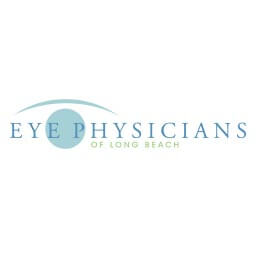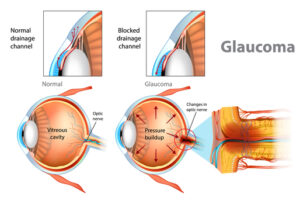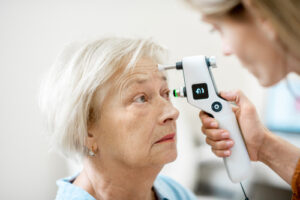Blog post by: Eye Physicians of Long Beach

Did you know that this month is Glaucoma Awareness Month? Glaucoma is called the thief of sight as it presents no warning signs, and once you’ve lost vision, it is irreversible.
Keep reading to learn why it’s vital to raise awareness on this condition and why Glaucoma Awareness Month is important!
1. Glaucoma is the Main Cause of Preventable Blindness in the United States

Roughly, 3 million Americans have glaucoma. Many people may not even be aware they have it. Part of the problem is that glaucoma often has few if any symptoms at all.
The best line of defense against this silent thief of sight? Awareness and frequent eye exams. If doctors and eye care organizations do not raise awareness about the importance of frequent eye exams to preserve vision, more people could lose their vision.
Making people aware of glaucoma by ensuring that regular eye exams are something they make a priority is the best way to save eyesight.
2. It’s a Crucial Time to Keep People in the Know about this Eye Condition

Glaucoma is a group of eye conditions that damage the optic nerve, which connects your eye to the brain. Damage to the optic nerve occurs as a result of abnormally high pressure in the eyes. This may lead to blindness or partial vision loss.
Glaucoma can occur at any age but it’s more prevalent in older adults who are over the age of 60. The disease affects both eyes, but one may be severely affected more than the other. Related symptoms of glaucoma that you may experience will vary depending on the stage and type of your condition.
These symptoms include:
- Eye pain
- Patchy blind spots in your central or peripheral vision
- Eye redness
- Blurred vision
- Seeing halos around lights
- Having severe headaches
- In the advanced stages, tunnel vision
Another problem with glaucoma is that these symptoms are not unique to only this eye condition. To be on the safe side, if you do experience any of these symptoms, you should see your eye doctor and determine what is going on. It could be glaucoma or it could be another eye condition or health issue.
3. You Can Lose as Much as 40% of Your Vision Without Noticing
It can sound crazy, but your mind is unaware of what you are not seeing. That is why many people with glaucoma lose their vision for years without realizing it. Needless to say, this is one reason why regular vision screening is key to preserving your vision.
You may begin compensating for the vision you’ve already lost even if you don’t notice you’re doing it. For this reason, once you’re 60 or older, you should see your eye doctor annually, or even more frequently, if you have a family history of glaucoma.
4. Glaucoma Awareness Month Educates the Community About the Importance of Routine Eye Exams

The best way to combat glaucoma is staying ahead of it. The easiest way to do that is to see your eye doctor for routine eye exams. Diagnosis of glaucoma starts with an in-depth review of your personal and family history as well as a comprehensive eye exam. Your ophthalmologist may perform various tests, including:
- Pachymetry to measure corneal thickness
- Visual field testing to see if there are any areas of vision loss
- Tonometry to measure your intraocular pressure levels
- Gonioscopy views the drainage angle
- Dilated eye exam and imaging tests to confirm whether there is any damage to the optic nerve
There are different types of glaucoma, and many of them don’t have specific warning signs. The effect is ever so gradual that you might not realize any change in your vision until it is at an advanced stage. For most people, this means that vision loss has already occurred.
Since vision loss from glaucoma is permanent, it’s essential to go to your eye doctor for frequent eye exams. Regular eye examinations can help to identify glaucoma in its early stages. Early diagnosis and treatment allow its progression to be halted or slowed down.
Initial treatment for glaucoma may entail lowering your eye pressure using oral medications, surgery, and prescription eye drops, or a combination of any of these. Surgery might be necessary to improve the drainage of fluid inside the eye, lowering the intraocular pressure.
5. Glaucoma Awareness Month Shows Support for People Living with Glaucoma
Glaucoma Awareness Month is also a time to share tips to help others live better with glaucoma, including:
Taking all glaucoma medications

If you have glaucoma, you may need to take different eye drops throughout the day to manage your intraocular pressure levels. Strictly adhering to your prescription can prevent your vision from worsening. It’s important to maintain a schedule and ensure you take the appropriate dosage on time. You can set alerts on your phone to get reminders throughout the day.
If you find it difficult to remember to take your eye drops, you may want to talk to your ophthalmologist at Eye Physicians of Long Beach about an option called Durysta. This new treatment is a great thing to consider if you have glaucoma and struggle to take your eye drops as directed!
Avoiding accidents and falls
For some people, glaucoma can increase the risk of falls and accidents because of the loss of side vision. If this is something you are familiar with, try marking clear boundaries in your home.
You can use paint or colored tape in areas like table edges, doorways, counters, and drawers.
You can also use the scanning technique that entails carefully looking at your surroundings. Move your head from top to bottom and left to right to cover the entire field of vision before you walk. This can assist you in identifying objects and steps missed along the way.
6. Glaucoma Specialists Use Glaucoma Awareness Month To Increase Perception
Glaucoma is more Prevalent in Hispanic, Asian, and African American populations. Other risk factors for the disease include:
- Thin corneas
- High eye pressure
- People who are over the age of 40
- People with a family history of glaucoma
The following are habits that can reduce the risk of losing your vision to glaucoma:
- Eat a diet rich in green, leafy vegetables and fruits
- Exercise regularly and moderately
- Maintain a healthy weight
- Remember to brush and floss your teeth daily, and visit your dentist frequently
- Take coffee in moderation, or better yet, drink tea insteadAvoid smoking
Cutting-Edge Glaucoma Technology and Treatment
Want to do something great for your eyes this Glaucoma Awareness Month? Schedule an appointment at Eye Physicians of Long Beach in Long Beach, CA! Regular eye exams at all ages are the best way to stay on top of your eye health!
